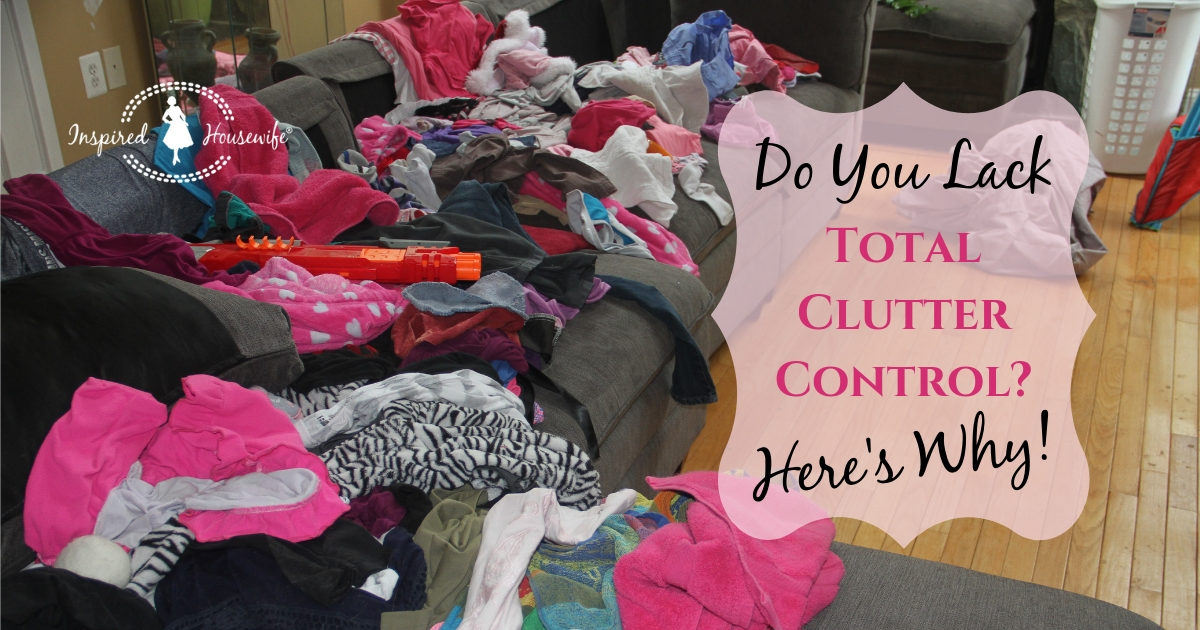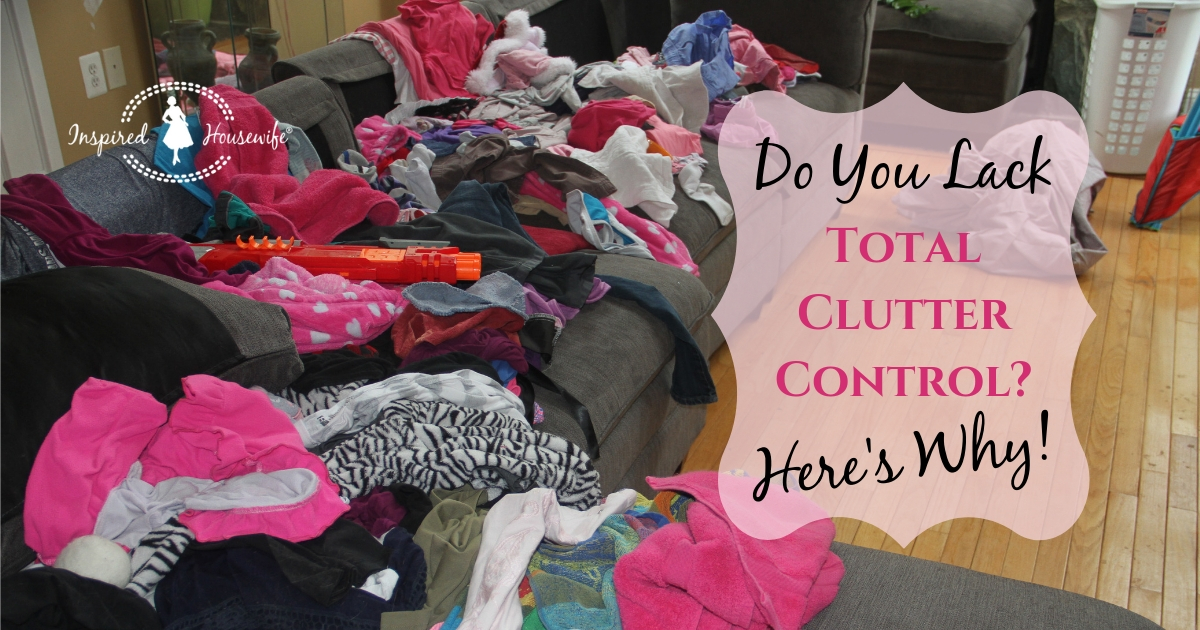What is Clutter to You?
I’m sharing why many of us lack total clutter control, because clutter is a disorganized home that barely functions, and a heart too stressed to experience satisfaction.
Clutter can be your catch-all dining table or the “junk drawer” you hope the guests don’t open. Still, to others, that “messy home” is a “loving home,” and that home’s “overseer of clutter” is actually “Super Mom.”
Clearly, clutter is in the eye of the beholder, but I suspect that yours is a pretty harsh perspective of anything related to self, as it is for me.
Why Should You Declutter
Clutter is embarrassing!
No matter how much we pretend we don’t “judge” people with messy homes, we all do.
We don’t pass a lasting judgment on the woman with the terrifying kitchen, nor do we inwardly criticize the mother with the unkempt, food-harboring hair. Even in that moment of recognizing what doesn’t instantly appeal to us, we can just as easily feel compassion for her.
After all, we’re mothers—we’ve been in her shoes a time or two. But, nevertheless, this brief glimpse into her mess has definitely given us an impression of her and her home that we can’t deny now exists and takes up residence in our thoughts concerning her.
This is precisely why we’re sometimes noncommittal or even guarded about having guests randomly pop into our own homes, isn’t it?
We’re downright ashamed that we haven’t done our best to ensure our home is in proper form for unexpected visitors.

Isn’t that the dream? Can you picture it now? I can.
I’m wearing some 50s-inspired pink dress in my exquisitely-clean and never-cluttered home. In walks a handful of my beautiful brood. It’s dinner time and I’ve got a cute pair of oven mitts on, ready to serve my family with a beaming smile.
Suddenly, the hubs comes dashing in, asking if there’s enough food for his colleagues and their wives to join us. Without hesitation, I tell the children to grab four more place settings. Ah, what bliss!
With an immaculate home, my only concern would be how many slices to cut in the pie… Gagworthy? Maybe to you. But you have to admit, that “exquisitely-clean” and “never-cluttered” home sure could make for a dreamy scene for just about any mother.
What’s your declutter dream scene? Whatever it is, I know there’s much more than embarrassment that drives you to declutter and organize your home.
What Do We Get From Having Clutter?
A cluttered home is suffocating and frustrating. Every task and activity that takes place in the midst of clutter and disorganization is enough to drive you over the edge. You feel guilty for being too busy to not only keep up with everything better.
I know how it is. You’re overwhelmed. These things happen. Things pile up. The laundry, especially. No one’s to blame; everyone’s to blame. It’s been a hard week, a hard month, a hard year.
You remember that time you got nearly everything done and then you couldn’t even stand or walk that evening?
You almost didn’t want to get out of bed the next day, so you allowed yourself to revel in a slow, luxurious morning as a reward for all your hard work, only to suddenly have the children home from school! Before you knew it, the house looked as if you’d never even tried at all!
We’ve all been there. Cluttering comes natural to families. Decluttering? Not so much. The good news? As long as we acknowledge and address the root causes of clutter, we can overcome it for good in our homes.
Why We Have Clutter (Root Causes)
Most clutter is caused by these main roots of poor behavior and unwell mindsets:
- Sentimentalism “Too busy”
- disObedient children
- Procrastination
- “I Can’t” excuses
- Laziness
- Unrealistic hopes
- Tedium (loss of inspiration due to monotony)
- Toxic relationships
- Exhaustion
- Reflections of the heart

These root causes are based on three underlying problem areas that perpetuate a cluttered lifestyle and home:
—unbridled emotional attachments and emotional liberties
—excuses for our secret unwillingness
—genuinely incapacitating schedules and predicaments
Using Emotions to Have Clutter
Sentimentalism, unrealistic hopes, and reflections of the heart are major emotional influences over a cluttered home.
Sentimentalism keeps you from creating your own fresh memories and identifying a space as purely your own.
The very thought of giving up something from the past can weigh you down with tremendous guilt, especially if someone else in your life has insisted that you should feel sentiment toward the object.
Small trinkets, photographs, letters, jewelry, a wedding dress, your grandmother’s favorite scarf, your mother’s collection of ornate dishes, or even a mountable piece of your late father’s run-down mustang are all acceptable treasures to keep for a lifetime.
But anything that takes up sizable space in your home (and garage), anything that cannot be stored away easily or placed neatly on a shelf or on the wall, anything that costs you storage fees, and anything that causes stress to you or your family is simply too much.
Unrealistic hopes revolve around the objects we know in our hearts that we’ll never use again.
Maybe it’s the goal dress you bought years ago and still haven’t lost weight for.
Maybe those 10 pairs of jeans you wore in college need to finally be re-homed?
Perhaps you’ve got a closet full of books you keep telling yourself you’re going to read one day.
It could be that car your husband or son swears they’re going to fix up, but it’s been 3 years since the cover’s been removed.
You know precisely what it is that you and your loved ones have harbored unrealistic hopes for. It’s time to be honest with yourself and let go.
There’s no reason why you or your family should be held back by futile hopes. It’s time to pave the way for truer possibilities.
The reflections of your heart are types of clutter related to how you’re feeling. If you’re overwhelmed, your house is going to reflect that. If you’re in a toxic relationship, your house is going to lack the support it needs to run smoothly—just like you.
In most cases, clutter is nearly always a heart matter, but the more you leave your cluttering feelings unchecked in the home, the more your home will work against you and further exacerbate whatever has you sad, depressed, angry, or burnt out in the first place.
You do yourself a disservice by dismissing the functionality of your home and your need for a decluttered space by using what you’re feeling as an excuse.
It’s not good enough—not for you, not for your husband, not for your children, not for the family and friends who want to visit you, and not for that beautifully creative and aspiring mind of yours.
You all deserve better.
Start by not using your home as a looking glass into the depths of your tortured soul.
Why Clutter Control is So Hard
Decluttering the home is a difficult and arduous process for various reasons.
First, this monumental task of thoroughly organizing and decluttering your home will no-doubt take at least a week.
Some of us wake up Monday morning and, before we know it, we’re going to bed Friday night. Where did all the time go?! Oh yeah—to every other pressing need while the house only got messier.
I know, I know, but it’s still not a good enough excuse.
Second, we’re our worst enemies. Like emotional causes to clutter, we are accustomed to making excuses instead of admitting our unwillingness.
To admit your unwillingness—and yes, even your laziness—would mean you’d have to acknowledge the type of woman you’ve allowed yourself to become.
I understand, though. We enter into marriage, motherhood, and even entrepreneurship with a go-getter attitude, only to have our previous worldviews squashed by the reality of what it means to be a wife, mother, and career woman all rolled into one.
Even being a stay-at-home mom can introduce us to the woes of seemingly endless tedium day in and day out, leaving us what appears to be a lackluster life.
We had expectations and now we’re plumb tired of having them dashed, aren’t we?
Why bother organizing the house when the children work against us?
Why clean today what can be put off for tomorrow and the next day and the next?
I get it.
Every mother, every wife, every woman gets it. But, just because you’re just another 1 in 3,815,013,002 dealing with this, doesn’t mean you should just accept it and succumb to it.
It takes some seriously uncomfortable truths before we’re willing to accept our part in the clutter. Inevitably, a lot of us have to face the harsh reality of it.
As homemakers and caretakers to our children, we’re the ones at the helm, steering the ship and commanding the sailors. If the ship is going down or in the wrong direction, it’s a good bet that we’re neglecting our own duties.
When your husband comes home and adds to the mess in some way or another, is that because he’s a big, misogynist brute? Or, could it be that he’s had a busy, stressful day, and the last thing on his mind is to find the proper place for his things?
Could it also be that you haven’t taken the time to officially create (or even purchase) those proper places?
Are there baskets or bins or hampers or hooks or shelves within view and within reach for a tired, worn out husband who can’t wait to undress and shut his mind off after dealing with real misogynist brutes all day?
Essentially, clutter control is all about time, perspective, and mindset. This is why decluttering is so difficult.
Too often, we excuse away our time and ignore the reality of an honest perspective. We tell ourselves that a cluttered home is X because of Y + Z, it’s never because of “I.”
We fill our time with other tasks and then we feel entitled to rest and relaxation in whatever free time or stolen procrastinating time we have.
Instead, we should make great effort to drastically change our lives and our family’s lives simply by donating a little time each day to the dream of a decluttered and organized home.
We feel like we don’t have a life because our house is so cluttered, and we tell ourselves that our house is so cluttered because we don’t have a life.
That’s nonsense and you know it—don’t you?
Acknowledge your reasons against decluttering for what they are—excuses (even good and reasonable excuses are still excuses). Be determined to give this all you’ve got. I think you are.
I think you’re here reading this because you can’t take another moment in your frustrating predicament. You are finally ready to discard the excuses, roll up your sleeves, and declutter and organize your home.
It’s time for my 7 decluttering ideas to avoid feeling overwhelmed.
My next post on clutter focuses on some things you can do to reduce or eliminate clutter in your own home.
Tell me more about what things prevent decluttering in your lives, and what you do for clutter control in the comments below.

